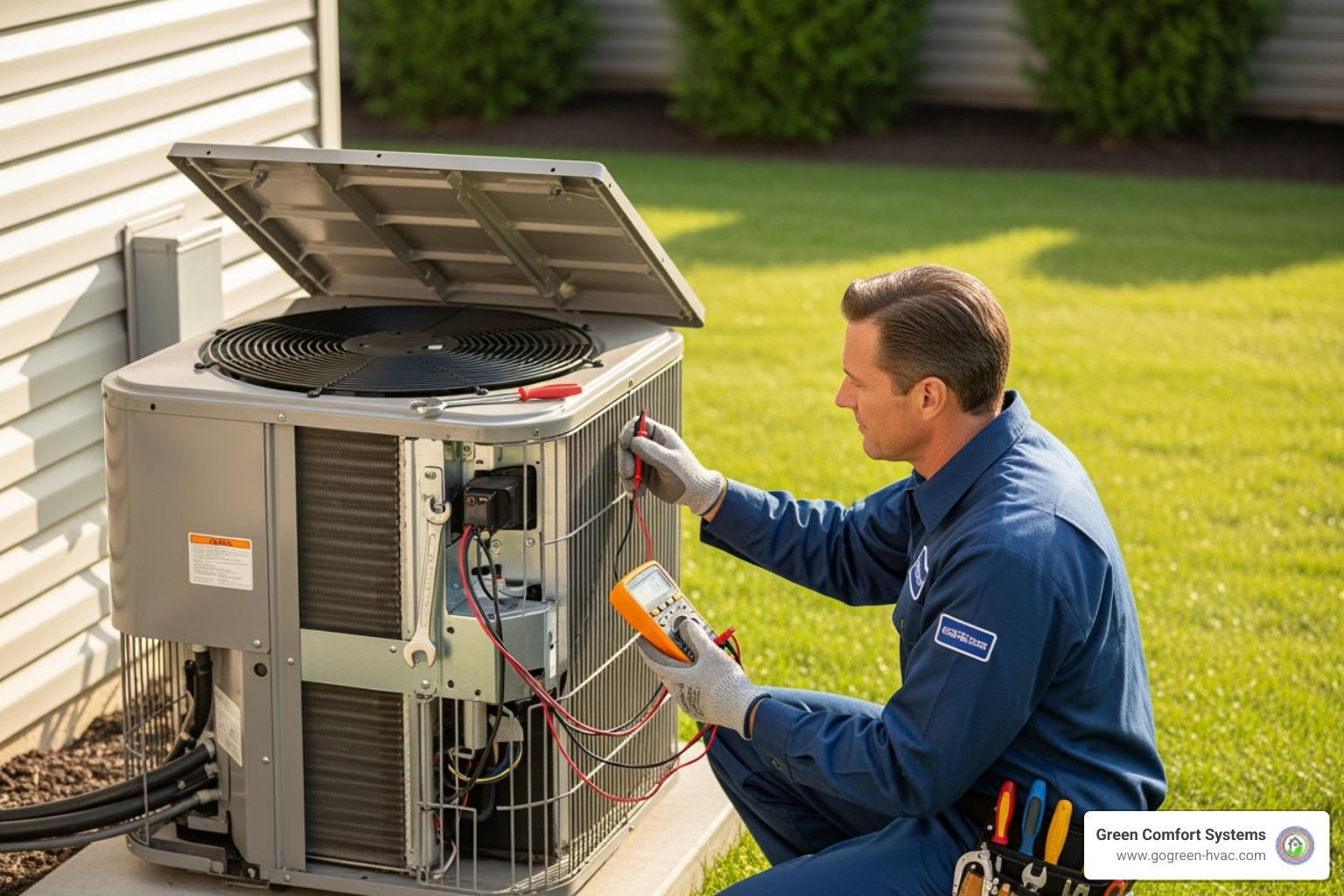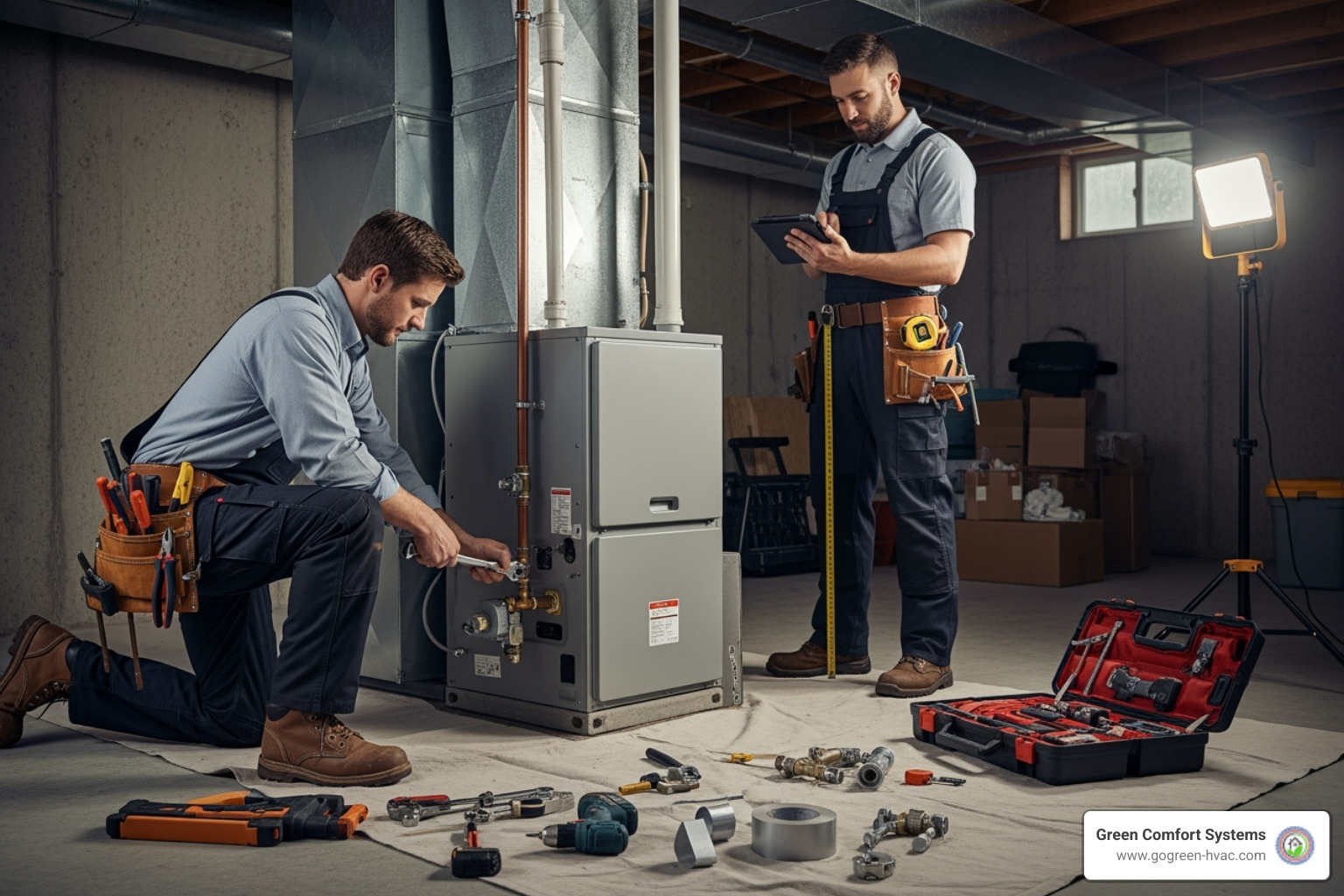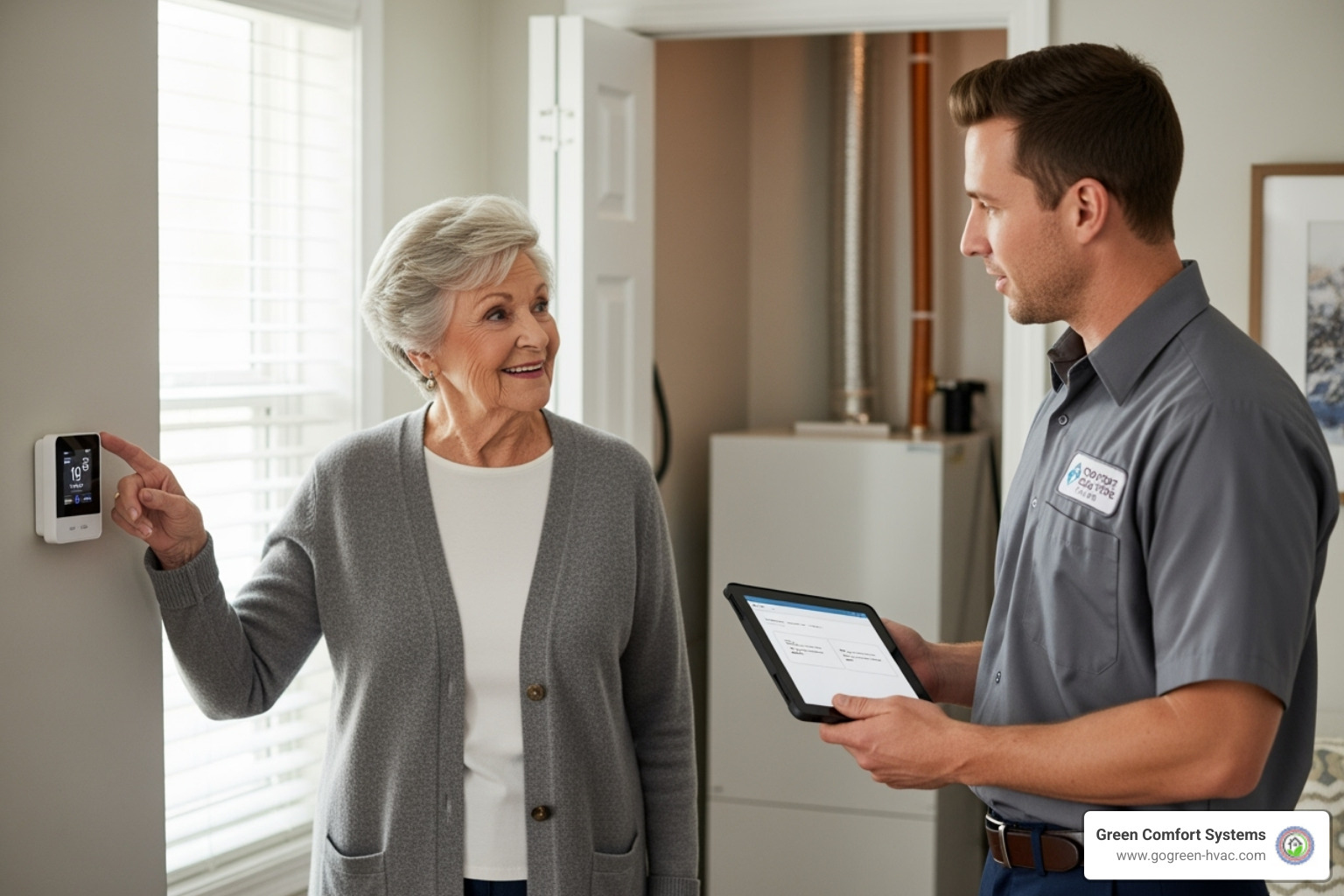Breathe Easy: Finding Your Perfect Eco-Friendly AC and HVAC Solution

Why Green HVAC Solutions Are a Smart Investment for Your Home
Green HVAC solutions are highly efficient heating and cooling systems that use 30-50% less energy than traditional models, significantly reducing your environmental impact. Here's what makes them a worthwhile investment:
Top Green HVAC Technologies:
- Geothermal heat pumps - Up to 400% more efficient than conventional systems.
- High-efficiency heat pumps - Ideal for moderate climates like Maryland.
- Dual-fuel systems - Combine electric heat pumps with gas furnaces for peak efficiency.
- Solar-powered systems - Harness renewable energy to power your home's comfort.
- Smart thermostats and ductless mini-splits - Offer precise temperature control and zoned comfort.
Key Benefits You'll See:
- Lower utility bills by 20-40%.
- Reduced carbon footprint.
- Improved indoor air quality.
- Government rebates and tax credits available.
- Longer system lifespan (15-25 years vs. 10-15 for traditional units).
For homeowners in Rosedale, MD, with aging systems or facing costly repairs, green solutions are a smart path forward. As the EPA's R22 refrigerant phase-out makes older system repairs more expensive, new eco-friendly units offer superior performance and reliability.
Modern green HVAC technology isn't just about environmental responsibility—it's about creating a more comfortable home while saving money every month. The key is finding the right system for your specific needs, climate, and budget.
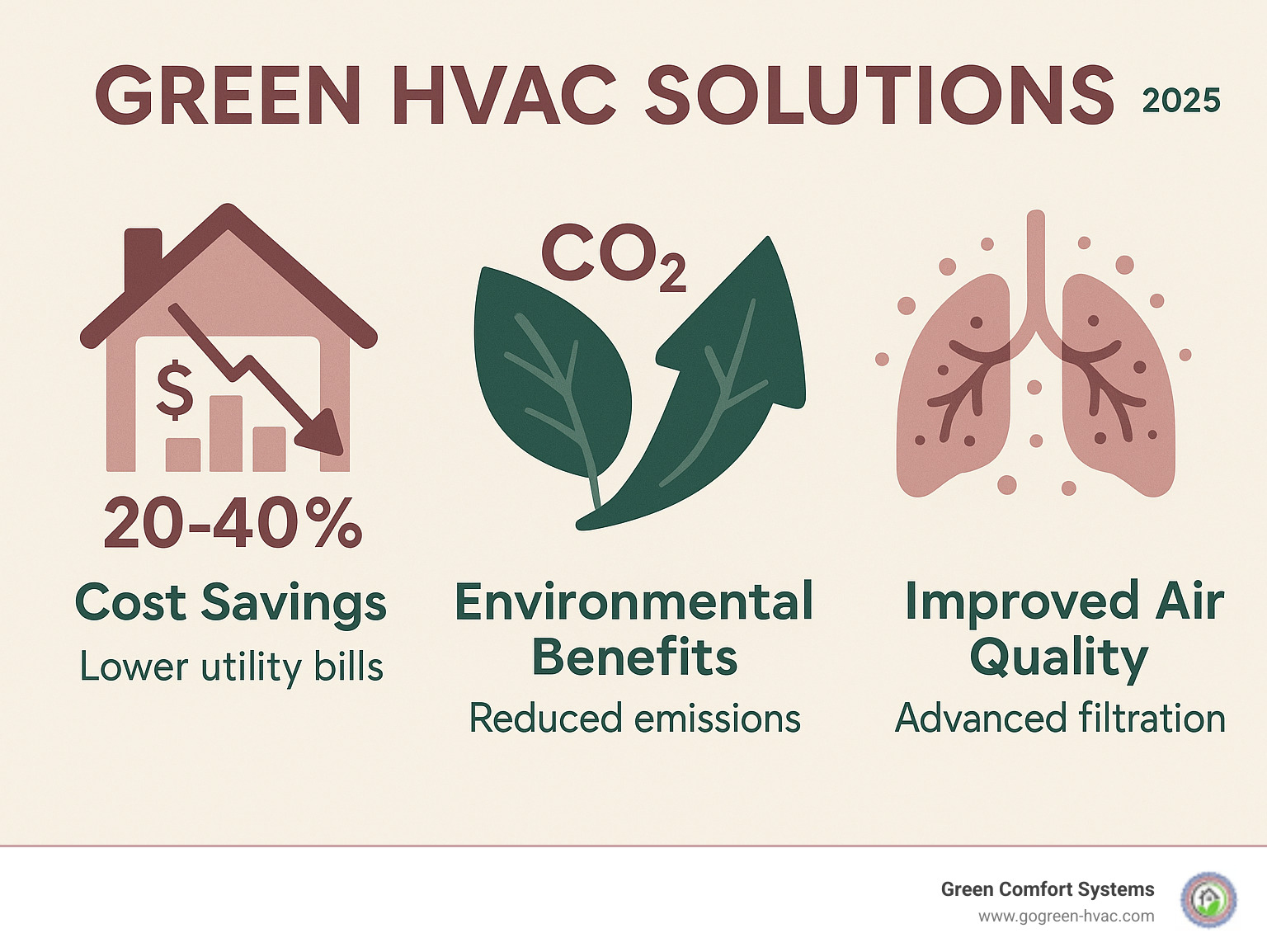
What Makes an HVAC System "Green"?
Green HVAC isn't just a buzzword; it's smart technology that delivers perfect indoor comfort while lowering utility bills and helping the planet. So what exactly makes an HVAC system "green"?
It starts with high energy efficiency. Green systems deliver the comfort you expect while using 30% to 50% less energy than traditional units. This efficiency translates directly into lower utility bills.
Green systems also dramatically reduce greenhouse gas emissions by consuming less power, especially from fossil fuel sources. When your system uses less energy, fewer harmful emissions enter the atmosphere, creating real environmental benefits.
Many of the best green systems tap into renewable energy sources. This includes solar panels powering your air conditioner or geothermal systems using the earth's natural temperature. The EPA's definition of green energy includes clean sources like geothermal, wind, and solar.
Sustainable materials also play a key role. Green HVAC manufacturers are increasingly using recycled components and adopting eco-friendly manufacturing processes, considering the system's environmental impact from start to finish.
Finally, these systems use non-toxic refrigerants. The old R22 refrigerant is being phased out by the EPA due to its harmful effects on the ozone layer. Modern green systems use environmentally friendly refrigerants like R410A, protecting you from the costly and difficult repairs associated with obsolete R22 systems.
This shift isn't just good for the planet—it protects you from expensive repairs and system failures. For more details about eco-friendly equipment options, check out our guide on Eco-Friendly HVAC Equipment.
The bottom line is that a green HVAC system provides optimal comfort with minimal environmental impact, creating a win-win for your home and the world.
Exploring the Spectrum of Green HVAC Solutions
The world of green HVAC solutions offers a custom option for nearly every home. Whether you're navigating Maryland's seasons or aiming to transform your home's energy use, there's a technology that fits your needs and budget.
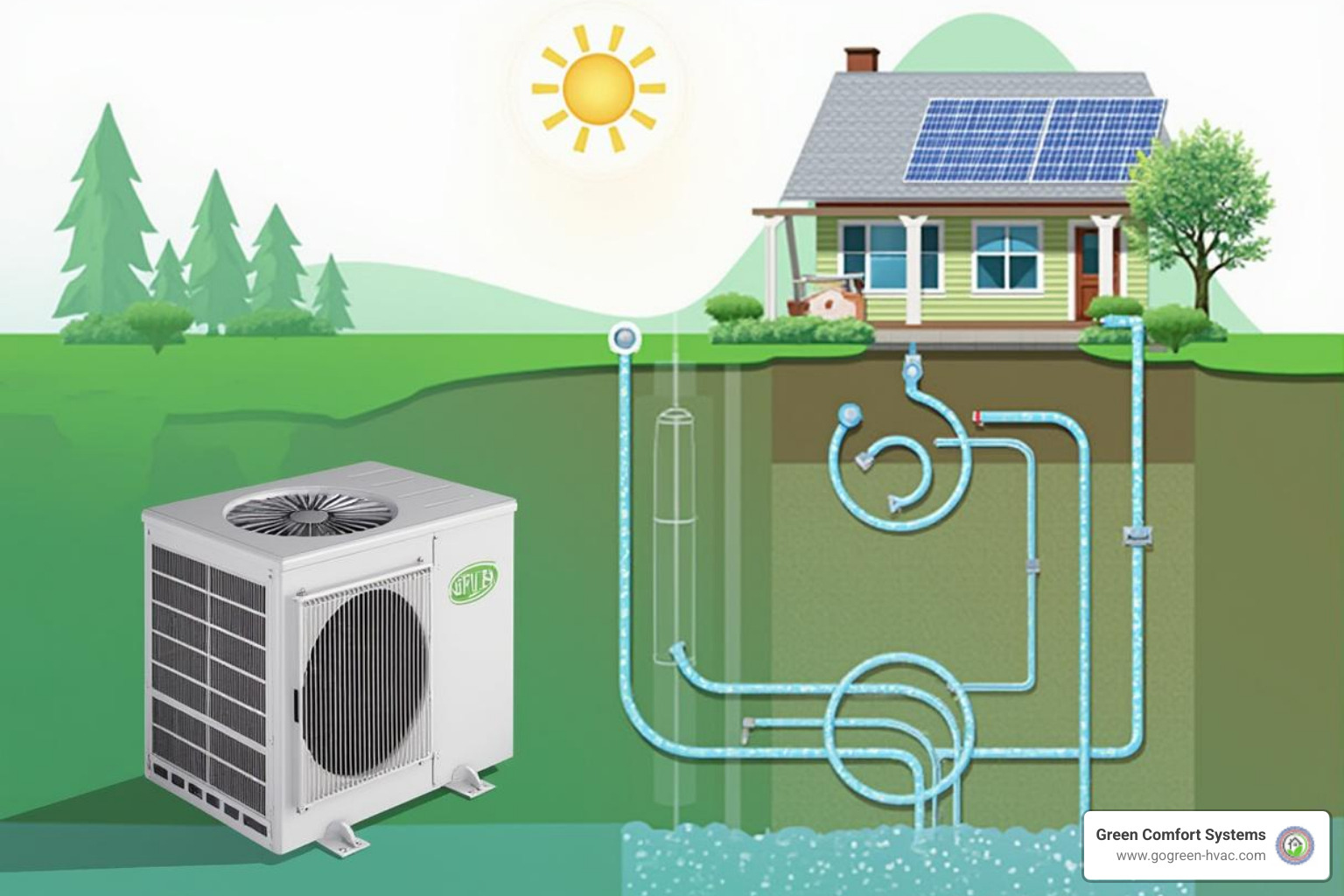
Think of it as choosing the right tool for the job. A geothermal system might be perfect for a large property, while a ductless mini-split could be the ideal solution for an older home. The key is understanding what each technology offers. Many homeowners even combine different green technologies for a customized solution.
Geothermal Heat Pumps
The secret to a geothermal heat pump's incredible efficiency lies just six feet underground, where the earth's temperature remains a stable 55 degrees year-round. The system circulates a water-based solution through underground pipes. In winter, it absorbs the earth's heat and brings it indoors; in summer, it pulls heat from your home and transfers it into the cooler ground.
The results are astounding: geothermal systems can be up to 400% more efficient than traditional HVAC. They achieve this by moving existing heat rather than creating it, producing up to four units of energy for every one unit consumed.
These systems are also built to last. With most components protected underground, geothermal heat pumps often operate for 15 to 25 years. They are also whisper-quiet, with no noisy outdoor unit.
High-Efficiency and Dual-Fuel Heat Pumps
For those not ready for geothermal, heat pumps are an excellent entry into green HVAC solutions. These versatile systems work year-round, pulling heat from the outside air in winter and pushing heat out of your home in summer. Modern heat pumps are remarkably efficient, capable of capturing heat energy even from cold air.
For Maryland homeowners, dual-fuel systems are game-changers. A high-efficiency heat pump handles most heating and cooling needs. When temperatures drop below 35 degrees, the system automatically switches to a gas furnace backup. This smart switching ensures maximum efficiency in mild weather and reliable warmth on the coldest days.
To learn more about the different efficiency levels available, check out our guide on Variable Speed vs. Two-Stage vs. Single-Stage Systems.
Solar-Powered and Other Renewable Systems
Solar-powered HVAC systems use photovoltaic panels to generate electricity for your heating and cooling equipment.
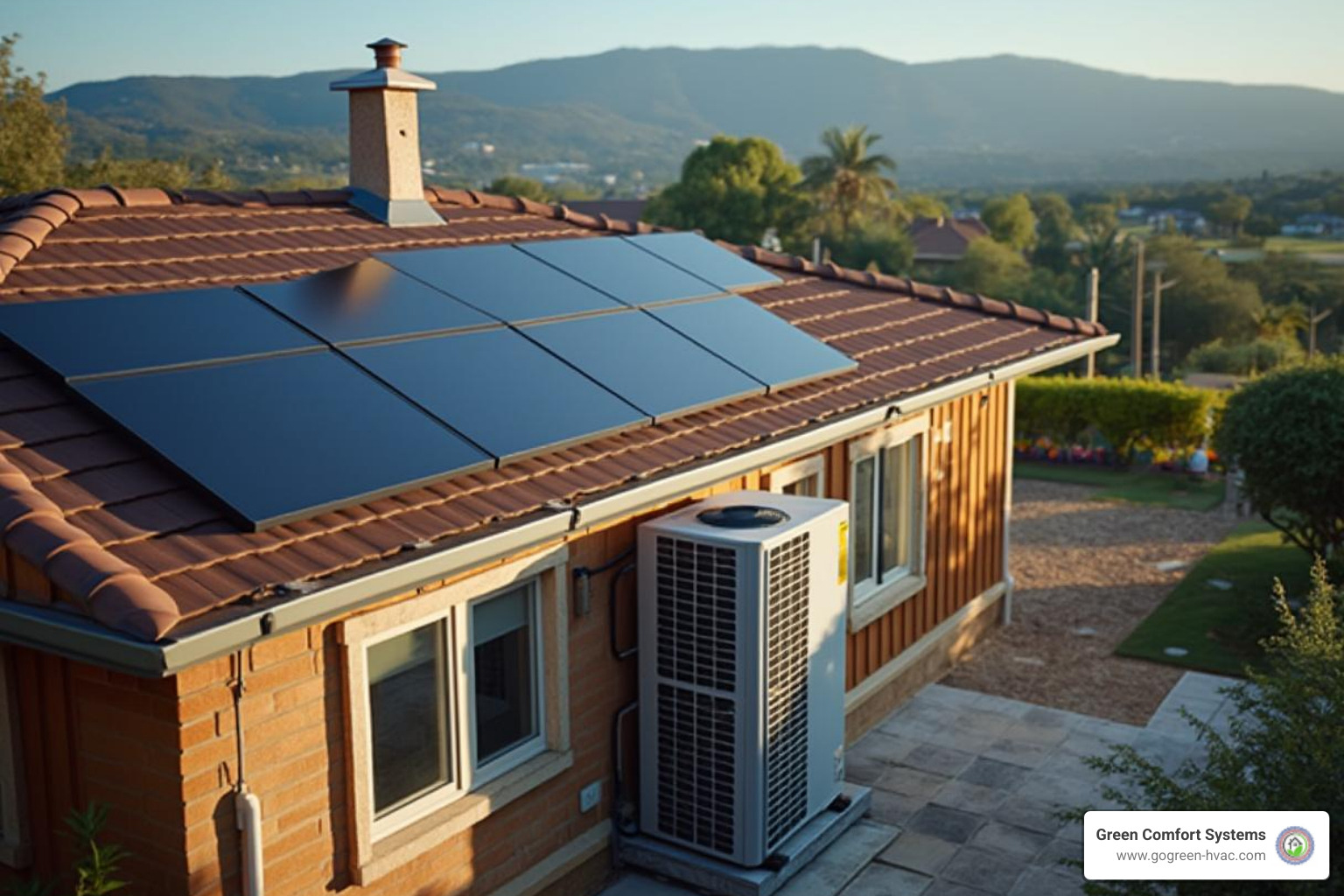
The appeal is clear: free energy from the sun leads to dramatically lower electricity bills and less reliance on the power grid. Other renewable options include wind-powered systems for water heating, ice-powered air conditioning that freezes water overnight for use during peak heat, and hydronic systems that use circulating water for silent, efficient heating and cooling.
Supporting Components for a Greener System
The best green HVAC solutions consider every detail. Ductwork is crucial, as poorly sealed ducts can waste 20-30% of your conditioned air. Modern quiet duct wrap made from recycled materials like cotton provides excellent, safe insulation to keep conditioned air in your living spaces.
Smart thermostats act as the brain of your system, learning your schedule and adjusting temperatures automatically to prevent waste. Many homeowners save 10-15% on energy bills just by upgrading to a smart thermostat.
If you're curious about your current ductwork's performance, learn more about our Duct Work services.
The Compelling Benefits of Going Green
Switching to green HVAC solutions is a smart investment that pays dividends in multiple ways. We've helped countless Maryland homeowners find just how transformative these systems can be.
Green HVAC systems typically cut energy consumption by 30-50% compared to older units. This translates directly to your utility bills, with expected savings of 20-40%. For homeowners, this means more money in your pocket each month, while business owners can see significant reductions in operational costs.
Beyond savings, you're also creating a healthier home for your family and helping protect the planet.
Financial Perks and Long-Term Savings
While the upfront cost of green HVAC solutions can seem high, the long-term financial benefits far outweigh the initial investment. The return on investment (ROI) is often faster than expected, with consistent monthly savings adding up over the system's 15-25 year lifespan.
Government incentives make the switch even more attractive. Federal tax credits, state rebates, and local utility programs can significantly reduce your upfront costs. We help our customers in areas like Catonsville, MD, steer available programs to maximize their savings.
Your home's value gets a boost as well. A modern, energy-efficient HVAC system signals lower utility bills and reliable comfort to potential buyers, increasing property value.
Here's a look at potential savings across different green technologies:
| Green HVAC System Type | Efficiency Insight | Potential for Savings |
|---|---|---|
| Geothermal Heat Pump | Up to 400% more efficient than conventional systems | Significant long-term savings through drastically reduced energy consumption |
| High-Efficiency Heat Pump | Reduces energy consumption by up to 30% | Substantial monthly bill reductions, especially in Maryland's moderate climate |
| Dual-Fuel Heat Pump | Automatically switches for optimal efficiency | Maximized savings by using the most efficient fuel source for current conditions |
| Solar-Powered HVAC | Reduces reliance on grid electricity | Lower electricity bills plus potential net metering credits |
A Healthier Home and Planet
The health and environmental advantages of green HVAC solutions are just as compelling as the financial perks.
Your indoor air becomes dramatically cleaner. Many green systems feature advanced filtration that captures allergens, dust, and pathogens with up to 99.9% effectiveness. With less reliance on combustion heating, there are fewer indoor air pollutants. This is especially beneficial for family members with allergies or respiratory issues. Learn more about our approach at More info about Indoor Air Quality.
Your carbon footprint shrinks significantly. Using 30-50% less energy directly reduces greenhouse gas emissions from power plants, helping to combat climate change.
You're helping phase out harmful chemicals. Modern green HVAC solutions use environmentally safe refrigerants, unlike the old, ozone-depleting R22 refrigerant. By choosing green technology, you're investing in comfort, savings, and a healthier, more sustainable world.
Your Practical Guide to Choosing and Installing a Green System
Transitioning to a green HVAC solution is exciting but can feel overwhelming. We're here to guide you through the process, from assessing your home's needs to ensuring a perfect installation.
There is no one-size-fits-all green HVAC solution. What works for a home in Ellicott City, MD, might not be the best choice for yours, which is why a personalized approach is essential.
Professional installation is critical. An improperly installed high-efficiency system leads to poor performance and wasted energy. These advanced units require certified technicians with specialized knowledge.
Before recommending a system, we conduct a thorough home assessment and a precise load calculation. We analyze your home's size, layout, insulation, and window efficiency. Proper sizing is crucial: an oversized system will cycle inefficiently, while an undersized one will struggle to keep up, increasing energy bills. If you're wondering about your current system, we have information on when your Home Needs New AC Installation.
Decoding Efficiency Ratings and Certifications
Understanding HVAC ratings helps you make smart decisions. Here are the key terms:
- SEER2 (Seasonal Energy Efficiency Ratio 2) measures cooling efficiency. Like MPG for a car, a higher SEER2 means less electricity use.
- HSPF2 (Heating Seasonal Performance Factor 2) measures a heat pump's heating efficiency. Higher numbers mean greater savings.
- AFUE (Annual Fuel Utilization Efficiency) shows how efficiently a furnace converts fuel to heat. An AFUE of 90% means 90 cents of every dollar heats your home.
The ENERGY STAR label is a simple indicator. This EPA certification guarantees the system meets strict energy efficiency guidelines, saving you money and protecting the environment. For more details, the Department of Energy offers a guide on How to read an EnergyGuide label.
Prepping Your Home for Maximum Efficiency
Installing a green HVAC system in an inefficient home is like filling a leaky bucket. A home energy audit is the best starting point to identify where you're losing energy.
- Proper insulation acts as a blanket for your home, keeping conditioned air inside. Heat pumps are most effective in well-insulated homes.
- Sealing air leaks around windows, doors, and pipes is a cost-effective way to prevent energy waste.
- Upgrading to energy-efficient windows creates a powerful partnership with your new green HVAC system.
- Right-sizing your system through a professional load calculation ensures you get the exact capacity you need, maximizing comfort and efficiency.
We offer comprehensive services to complement your new HVAC system. You can learn more at our Insulation Installation services.
Key Considerations for Your Green HVAC solutions
Choosing the right green HVAC solution involves balancing several factors:
- Your local climate is a major influence. In Maryland's moderate climate, high-efficiency heat pumps are often ideal. For harsher winters, a dual-fuel system may be a better fit.
- Upfront costs vs. long-term savings requires a big-picture view. While initial costs are higher, energy savings, incentives, and increased home value often make green systems the more economical choice over time.
- Maintenance requirements are generally lighter for modern green systems, which are built to last 15-25 years with proper care, compared to 10-15 years for conventional units.
- The future of green technology is bright. Investing now positions your home to benefit from ongoing innovations.
Frequently Asked Questions about Eco-Friendly HVAC
We enjoy talking with homeowners about switching to green HVAC solutions. Here are answers to some of the most common questions we hear in Maryland.
How much can I really save with a green HVAC system?
This is a great question, and the answer is encouraging. Our customers typically see their energy consumption drop by 30-50% after installing a green HVAC system. This often translates to a 20-40% reduction in monthly utility bills.
Your exact savings depend on several factors: your local climate, your home's insulation and air sealing, and the type of system you choose. Geothermal systems often deliver the most dramatic savings, but heat pumps and dual-fuel systems also provide excellent returns. Some commercial systems can have a payback period of just 2-3 years, and while residential periods may be longer, it's a solid investment that provides returns for years.
Is a heat pump a good choice for my climate?
For many Maryland homeowners, heat pumps are a fantastic choice. They are highly effective in moderate climates like ours, efficiently pulling heat from the outside air even on cool days. They provide year-round comfort while using significantly less energy than traditional systems.
For regions with colder winters, dual-fuel systems are a game-changer. A heat pump handles most of the heating, but the system automatically switches to a gas furnace backup during extreme cold. This ensures you stay comfortable while maximizing efficiency.
Crucially, proper home insulation is vital for heat pump performance. A drafty home forces any heating system to work overtime, so we recommend addressing any insulation issues to get the most out of your new system.
What does the R22 refrigerant phase-out mean for me?
If your HVAC system is over a decade old, this phase-out likely affects you. R22 (Freon) was banned for new production and import as of January 1, 2020, because scientists found it damages the ozone layer. While recycled R22 can be used for repairs, the supply is dwindling and expensive.
This makes R22 repairs incredibly costly. A simple leak detection can run hundreds of dollars, and a significant recharge can approach the cost of a new unit. Unfortunately, you cannot convert an old R22 system to use modern refrigerants like R410A, as they operate at different pressures and require different components.
Upgrading to a new system with modern, eco-friendly refrigerant is the best solution. You'll gain better efficiency, lower bills, improved comfort, and the peace of mind that comes with a reliable, environmentally safe system. For more details, you can review the R22 phase-out documentation from the EPA.
Conclusion: Take the Next Step Towards a Greener Home
As we've explored, green HVAC solutions are more than just heating and cooling systems. They are a smart investment in your family's comfort, your finances, and our planet's future.
Imagine saving 20-40% on your monthly utility bills while breathing cleaner air. Your new system could last 15-25 years—significantly longer than a traditional unit—with fewer headaches along the way. With government rebates and tax credits available, the upfront investment is even more manageable.
From geothermal systems that are up to 400% more efficient to versatile heat pumps perfect for Maryland's climate, there is a green solution for your home. Whether you're dealing with an aging R22 system or simply want to upgrade, the benefits are clear.
Making an informed decision is empowering. You now understand key efficiency ratings, the importance of insulation, and the benefits of different green technologies.
At Green Comfort Systems, our commitment to environmental responsibility is at our core—we plant trees for every service and installation. When you work with us in areas like Rosedale, Dundalk, or Baltimore, you're partnering with a team that genuinely cares. Learn more about our commitment to Giving Back to the Environment.
Our expert team will assess your needs, explain your options, and ensure your new system is perfectly sized and professionally installed. Ready to start your green HVAC journey? If you're in Forest Hill, MD, and interested in exploring ductless options, you can contact us to discuss mini-split installation in Forest Hill, MD.
The future of home comfort is green, efficient, and affordable. Let's work together to make your home a model of comfort and environmental responsibility.
Book Expert Service Or Contact Us
Other Blogs





Get Financing Today
Get the comfort you deserve, without the financial stress.

Latest Blogs








